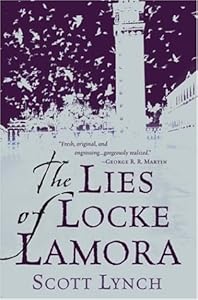Bitter Seeds (Milkweed Triptych #1): Review
Gasp! What is this, another blog entry? Could it be?

Yes, I know, it's been a long time since the last post, which had been an even longer time since the one before that. Apologies, gentle readers (imaginary though you may be), but I have been busy preparing for April's Scriptfrenzy challenge (a widget for which can be found on the far right sidebar), which began yesterday. I'll post more of that, with possible excerpts from my work in progress later. For now though, let's review Bitter Seeds. Join me, won't you?
Bitter Seeds, by Ian Tregillis, is an alternate-history story set in World War II, in a world that the supernatural really does exist in. The Nazis have put together a team of super-soldiers, each with a different ability. Think of it as a dieselpunk Nazi X-Men. One man has the power of flight, another pyrokinesis, and a third the ability to walk through walls. Then there is the girl who can become invisible, and most important of all, the young woman that can see the future. These abilities are not free to use though, instead they have wires implanted into their skulls which pump electricity straight into their brains from a battery they must wear on their belts.
Thanks to this, the course of the war is changed. I won't go into how it is, suffice to say that in this altered timeline, the Nazis are taking Europe by storm, and the only nation willing to fight them is Great Britain, itself battered and almost crippled. So they seek out their own weapon of unnatural means: a secret order of Warlocks who commune with the very forces of Reality.
They don't perform magic, per se. Instead they communicate and make deals with a race of "aliens" (or extradimensional beings, whatever) who are able to shape the fabric of reality at their will. For a price. And this price is always, always in blood.
Bitter Seeds is not a lighthearted read. The reader is treated to sections from both sides point of view, a tactic which humanizes both, treating both the British protagonists and the Nazi antagonists as humans, characters that are introduced as children who are moulded to fit a life by the men who raised them. None of the main characters are good, nor are they evil really. They walk a fine line in a world shaded by grays, and must deal with the consequences of their actions.
I really enjoyed Bitter Seeds, and while it was not perfect, Ian Tregillis crafted an excellent first novel, the first in a trilogy. Do I want to see what happens next? Absolutely. But I think I might need a break from the bleakness of this new world, and seek entertainment elsewhere before continuing on in the sequel, the Coldest War.
If you are interested in alternate-histories of World War II (and beyond), enjoy a supernaturally charged book that feels almost too real to actually be dubbed as true "dieselpunk" or urban fantasy of any sort, then I would highly recommend this debut novel.
Rating: 7/10
Note on Edition: I listened to the edition produced by Audible Frontiers, narrated by Kevin Pariseau. A quick word on this edition; when I first began to listen to Mr. Pariseau's narration, I really did not enjoy it. But as soon as we got into the real dialogue, and the meat of the story, that turned around. His accents, while a little colorful for the German characters, were nonetheless interesting and well done. He impressed me with his range, and if you are a big audio book person (like I am), then you will enjoy his rendition.
Narration: 8/10








